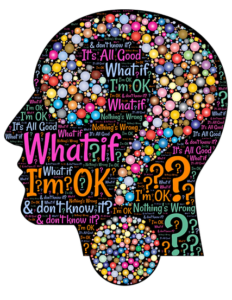Do you ever have thoughts that make you feel uncomfortable? Thoughts that seem to come out of nowhere and make you feel like you’re going crazy? If so, then you may be experiencing intrusive thoughts. Intrusive thoughts are a symptom of OCD, and they can be incredibly disruptive and anxiety-provoking. In this blog post, we will discuss what intrusive thoughts are, and we will provide some tips for coping with them.
Contents
What Are OCD Intrusive Thoughts?

OCD in the form of intrusive thoughts involves unwanted, recurrent, and persistent ideas or images that cause tremendous distress. These thoughts may be disturbing and can often involve themes such as violence, sexuality, religion, self-harm, contamination, and death. Intrusive thoughts are not a sign of mental illness in themselves; however, if they become so frequent or severe that they interfere with daily functioning then it might be necessary to seek help from a professional.
In addition to the mental distress, intrusive thoughts can cause, they may also be accompanied by physical symptoms such as sweating, trembling, dizziness, increased heart rate, and breathing rate, or a sensation of fear.
The negative thoughts associated with OCD intrusive thoughts can be so intense that they cause a person to worry, obsess over them, and feel out of control. Also, they can lead to a vicious cycle in which the person tries to suppress the thoughts, but this only leads to further distress and makes them more likely to recur.
Treatment of OCD Intrusive Thoughts
Treatments for intrusive thoughts vary depending on the severity and type of OCD. The primary treatments are therapy that can help to manage the symptoms, as well as medications that can help reduce anxiety and depression.
There are many types of therapies available for treating intrusive thoughts.
Therapy for OCD Intrusive Thoughts
Therapy is an important part of treating intrusive thoughts and OCD. There are many types of therapy for OCD, including cognitive-behavioral therapy (CBT), acceptance and commitment therapy (ACT), and exposure response prevention (ERP). These therapies are designed to help people better manage their intrusive thoughts and learn how to respond differently when they experience them.
Types of Therapy for OCD Intrusive Thoughts

Therapy for OCD intrusive thoughts often focuses on cognitive-behavioral therapy (CBT). CBT is a form of psychotherapy that helps people identify and change thoughts, feelings, and behaviors that are contributing to their suffering. It also helps individuals develop skills for managing OCD symptoms.
Other common therapies used to treat OCD intrusive thoughts include Exposure and Response Prevention (ERP), Acceptance and Commitment Therapy (ACT), Dialectical Behavioral Therapy (DBT), Mindfulness-Based Cognitive Therapy (MBCT), and Schema-Focused Therapy.
CBT
One of the primary forms of therapy for OCD intrusive thoughts is cognitive-behavioral therapy (CBT). CBT helps individuals identify and challenge the negative beliefs that accompany their intrusive thoughts. It also assists them in developing healthier thinking patterns to replace the maladaptive ones they may have developed as a result of their OCD.
CBT works by gradually exposing the person to thoughts, activities, and situations that may trigger their obsessive-compulsive behavior. Through this process, individuals learn to manage their anxiety and challenge their irrational fears to reduce distress and offer more adaptive responses.
ERP
Exposure and Response Prevention (ERP) is another common therapy for OCD intrusive thoughts. ERP involves gradually exposing an individual to triggers that spark their obsessions or compulsions. The therapist then helps the client practice resisting and performing compulsive behaviors in response to these triggers. This progressive exposure helps people learn how to cope with fear while allowing them to gain confidence as they master new skills for coping with anxiety.
ACT
Acceptance and Commitment Therapy (ACT) is a form of psychotherapy that emphasizes mindful acceptance of thoughts and feelings while promoting commitment to action. ACT assists individuals in developing a sense of purpose, values, and meaning in their lives by accepting difficult thoughts and urges without acting on them. This helps people learn to accept themselves despite the presence of intrusive thoughts or obsessions.
DBT
Dialectical Behavioral Therapy (DBT) is another form of therapy used to treat OCD intrusive thoughts. DBT works by helping individuals identify and manage their emotions more effectively through developing insight into the problem behaviors associated with OCD. It also teaches skills for managing distress, regulating emotions, improving communication, and constructing healthy relationships with others.
MBCT
Mindfulness-Based Cognitive Therapy (MBCT) is a form of psychotherapy that combines elements of CBT and mindfulness-based practices. MBCT helps individuals develop more mindful awareness of their thoughts, feelings, and behavior patterns to gain insight into how they are influencing their OCD symptoms. This type of therapy helps people learn to observe their intrusive thoughts without judgment and respond to them more adaptively.
Schema-Focused Therapy
Lastly, Schema-Focused Therapy is a type of cognitive-behavioral therapy that focuses on identifying maladaptive thought patterns associated with OCD intrusive thoughts and replacing them with healthier behaviors. This therapy works by helping the individual become aware of the unhelpful schemas or beliefs underlying their obsessive thinking and irrational fears. Through this process, individuals learn to reframe their thinking in more adaptive ways so that they can better manage their intrusive thoughts.
Benefits of Therapy for OCD Intrusive Thoughts

The primary benefit of therapy for OCD intrusive thoughts is that it can help reduce the intensity and frequency of the obsessions. Some other benefits are:
Improves Quality of Life
One of the primary goals of therapy is to improve the quality of life for those with OCD intrusive thoughts. By addressing their obsessions and compulsions, individuals can enjoy activities they once avoided and find new ways to cope with stress. This improved quality of life can be seen in all areas, from social interactions to work performance.
Reduces Fear and Anxiety
Therapy can also help reduce fear and anxiety associated with obsessive-compulsive disorder. Through cognitive behavioral therapy (CBT) or other forms of mental health treatment, individuals can challenge their anxious thoughts and learn how to manage them better. With help, they can become more confident in their abilities to handle difficult situations without becoming overwhelmed by negative emotions or intrusive thoughts.
Increases Understanding
Therapy can also help individuals gain a better understanding of their OCD intrusive thoughts. It can provide an opportunity to learn more about the disorder and how it affects them. Through this process, they may be able to develop new strategies for managing their obsessions and compulsions that can lead to improved mental health. By gaining insight into their thoughts, feelings, and behaviors, those with OCD intrusive thoughts are often better equipped to make meaningful changes to reduce symptoms.
Develops Healthy Coping Strategies
Finally, therapy for OCD intrusive thoughts can help individuals develop healthier coping strategies for dealing with their obsessions and compulsions. In addition to learning how to recognize when obsessive-compulsive urges arise, individuals can also practice relaxation techniques or mindfulness exercises that can help them stay focused and in control. With these skills, they can be better equipped to manage their intrusive thoughts without getting overwhelmed.
By addressing the underlying issues that contribute to OCD intrusive thoughts and providing individuals with the tools needed to cope with their obsessions and compulsions, therapy can provide long-term relief from anxiety, fear, and other symptoms of OCD. Through therapy, those affected by OCD intrusive thoughts can learn how to better manage their disorder and lead a more fulfilling life.
Alternatives of Therapy for OCD Intrusive Thoughts

Other than therapy, some other options can be used to help with OCD intrusive thoughts.
1) Medications: One potential treatment for OCD intrusive thoughts is the use of antidepressant medications such as selective serotonin reuptake inhibitors (SSRIs). SSRIs are designed to help balance certain chemicals in the brain, which can reduce symptoms of OCD.
2) Relaxation Techniques: Relaxation techniques, such as deep breathing exercises and progressive muscle relaxation, can be used to combat intrusive thoughts. They can help an individual stay grounded in the present moment and focus on something other than their obsessive thoughts.
3) Self-Care: People with OCD’s intrusive thoughts can practice self-care to help manage their symptoms. This includes eating a balanced diet, getting regular exercise, and setting aside time for activities they enjoy. These activities can help to reduce stress which can be a major trigger for obsessive thoughts.
4) Support Groups: Joining a support group can provide individuals with OCD intrusive thoughts a safe space to talk about their experiences without fear of judgment or criticism. Talking with others who are going through similar struggles can be beneficial because it helps provide validation, understanding, and motivation.
Conclusion
OCD intrusive thoughts can be difficult and distressing, but it is important to remember that they do not define who you are. It is possible to take steps to reduce the frequency and intensity of intrusive thoughts. By learning more about obsessive-compulsive disorder and seeking professional help, it is possible to gain control over your thoughts and lead a fulfilling life. With determination, effort, and the right resources, anyone can learn how to manage their OCD intrusive thoughts.
For more information and guidance, please contact OCDMantra. OCD is a mental health disorder characterized by obsessions and compulsions. If you have any queries regarding OCD treatment, ERP therapy experienced therapists at OCDMantra can help: Book a trial OD therapy session.


